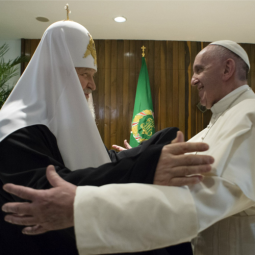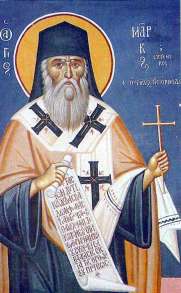BLOGS » EDWARD PENTIN
EdwardPentin
Плоды встречи между Франциском -Кириллом. Но Украинская Церковь разочарована
Fruits Emerge From Francis-Kirill Meeting But Ukrainian Catholics Disappointed

Pope Francis’ historic meeting with Patriarch Kirill of Moscow last Friday is already bearing some fruit, but Ukrainian Greek Catholics are largely disappointed with the joint declaration as it emerges their leader was not consulted in its preparation.
After the Pope and the Patriarch met for the first time in centuries in Havana last week, the Catholic archdiocese of the Mother of God in Moscow has said it is expecting more intense pilgrim exchanges between the Moscow Patriarchate and the Vatican.
"Pilgrim exchanges exist, but I think that they can reach a new level," the archdiocese's press secretary, Father Kirill Gorbunov, told reporters in Havana on Feb. 14. He did not rule out that Orthodox and Catholic priests could jointly accompany both churches' groups of pilgrims "in order to show such a stereoscopic vision,” according to the Russian news agency Interfax, Feb. 14.
Overall, the meeting has raised hopes of “restored Christian unity” and a possible trip by Pope Francis to Moscow as the next significant and symbolic step in thawed Catholic-Russian Orthodox relations..
But the Major Archbishop of the Ukrainian Greek Catholic Church, His Beatitude Sviatoslav Schevchuk, cautioned that it was important “not to dramatize” the declaration, nor “exaggerate its importance for Church life”.
In an interview published on the UGCC website Feb. 14, he said the declaration is generally “positive” and it “opens new perspectives for cooperation”. But when it came to Ukraine, it “raised more questions than answers”.
For years, the Vatican has played down or ignored the concerns of Ukrainian Catholics and their very troubled history with the Russian Orthodox Church in order to maintain cordial relations with the Moscow Patriarchate. After Friday's meeting, Ukrainian Catholics feel little has changed.
Archbishop Schevchuk said many Ukrainian Catholics had contacted him to say they felt “betrayed by the Vatican” and “disappointed by the half-truth nature” of the declaration. He said they “even see it as indirect support by the Apostolic See for Russian aggression against Ukraine.” They are sentiments, he said, that he “can certainly understand.” He himself took a more positive view but is not without his reservations.
He praised Pope Francis, saying that he felt an “authentic admiration, respect, and a certain reverential awe” for his humility in going ahead with the meeting. While the Russian Orthodox saw it as a political meeting (they insisted there be no common prayer), Francis saw the encounter as a “spiritual event”, therefore reflecting “two parallel realities” with both Churches “pursuing different goals.”
The archbishop criticized the drafters of the declaration: Metropolitan Hilarion, the Russian Orthodox Church’s “foreign minister”, and the Pontifical Council for Promoting Christian Unity. The latter, he said, is “no expert in matters of international politics” and, in his view, was “exploited” by Metropolitan Hilarion’s office.
Perhaps most surprisingly, Archbishop Schevchuk said he was not consulted in the drafting of the document, despite being a member of the Pontifical Council. As has happened before, he said, “they spoke about us without us, without giving us a voice.”
As to the two paragraphs concerning Ukraine (nos. 25 and 26), he welcomed the fact that the Moscow Patriarchate now recognizes the right of Ukrainian Greek Catholics to exist. Until now, it has demanded from the Vatican a virtual ban on their existence (but he pointed out that to exist, they are “not obliged to ask permission from anybody.”)
He also welcomed the recognition that Orthodox and Greek Catholics are in “need of reconciliation” and “mutually acceptable forms of co-existence.” This, he hoped, could lead to better bilateral relations “without interference from Moscow”.
But Archbishop Schevchuk was displeased with paragraph 26, saying that it merely refers to Russia’s annexation of Crimea, a part of Ukraine, in 2014, as a “conflict” rather than act of aggression against a neighboring state. He pointed out that were it not for the blessing of the Russian Orthodox Church, the annexation and war that followed wouldn’t have taken place.
The paragraph also calls on Ukraine’s churches to “refrain from taking part in confrontation" and supporting further development of the conflict. Archbishop Schevchuk countered that the UGCC “has never supported nor promoted the war”, but will support the people of Ukraine. “We have never been on the side of the aggressor,” he said. He believes the paragraph was written by Metropolitan Hilarion who, he said, has a record of attacking what he calls “Ukrainian schismatics and Uniates.”
The archbishop encouraged all to look at the “positive elements” of the declaration, but also did not conceal his disappointment.
“We have experienced more than one such statement,” he said, “and will survive this one as well.”
http://www.ncregister.com/blog/edward-pentin/fruits-emerge-from-francis-kirill-meeting-but-ukrainian-catholics-disappoin/
Read more: http://www.ncregister.com/blog/edward-pentin/fruits-emerge-from-francis-kirill-meeting-but-ukrainian-catholics-disappoin/#ixzz3zzDZu8yp

